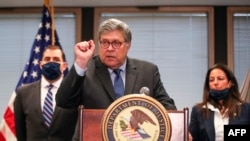The Justice Department is touting the success of its "China Initiative," saying it has achieved "substantial progress" in disrupting and deterring Chinese efforts to subvert U.S. economic and national security.
In a statement Monday, the second anniversary of the China Initiative, Attorney General William Barr said the department has made “incredible strides” in countering the Chinese threat.
"While much work remains to be done, the department is committed to holding to account those who would steal, or otherwise illicitly obtain, the U.S. intellectual capital that will propel the future," Barr said.
The China Initiative was launched in November 2019 by then attorney general Jeff Sessions, who said at the time that "we see Chinese espionage not just taking place against traditional targets like our defense and intelligence agencies, but against targets like research labs and universities, and we see Chinese propaganda disseminated on our campuses." The goal was to enhance the Justice Department's investigation and prosecution of these Chinese efforts.
Under current attorney general William Barr, the Justice Department has put additional resources into the effort. In July, FBI Director Christopher Wray said the bureau had nearly 2,500 China-related counter-intelligence cases.
"The Chinese Communist Party's theft of sensitive information and technology isn't a rumor or a baseless accusation," FBI Director Christopher Wray said in a statement. "It's very real, and it's part of a coordinated campaign by the Chinese government, which the China Initiative is helping to disrupt."
The FBI, Wray added, opens a new China-related counterintelligence case nearly every 10 hours and “we'll continue our aggressive efforts to counter China's criminal activity."
The tough rhetoric comes amid rising tensions between the U.S. and China over an array of issues including the coronavirus pandemic, Hong Kong's sovereignty and China's military posture in the South China Sea.
President Donald Trump negotiated the first phase of a trade deal with China in January. But since the coronavirus outbreak spread from Wuhan, China, shortly thereafter, Trump has turned increasingly hawkish toward Beijing, blaming it for exporting the virus to the U.S.
U.S. officials say China's economic espionage and theft of U.S. trade secrets is part of its ambition to supplant the U.S. as the world's only superpower. Experts agree that China engages in nefarious activities in pursuit of its global ambitions, ranging from traditional economic espionage and cyberattacks to reliance on "non-traditional collectors" of intelligence, such as academics.
The Justice Department says its focus on academic institutions includes raising awareness about the Chinese threat as well as prosecuting researchers who have hidden their ties to the Chinese government. Critics say the initiative has swept up researchers unconnected to Chinese intelligence.
"Many of these cases appear to be people who are double dipping and not reporting income," said Donald Clarke, a law professor at George Washington University. "This is not necessarily related to a Chinese intelligence gathering program.
Former U.S. Energy Secretary Steven Chu said that while China is undoubtedly engaged in "very deep industrial espionage," Chinese talent is being driven away from U.S. institutions by "the actions of U.S. government and innuendoes of U.S. government."
"This is not only true of academics but [also of] people who are going into industry, the high-tech industries," Chu, a Noble laureate and physics professor at Stanford University, said during a recent webinar on the China Initiative. "A large fraction of the stuff being created in American universities and industry (is) actually coming from Chinese immigrants."
In September, the U.S. revoked the visas for more than 1,000 Chinese graduate students and researchers with suspected ties to China's military. The Trump administration has charged that Chinese students have come to the United States to steal intellectual property to advance China's economic and military sectors.
U.S. law enforcement officials insist the China Initiative is not aimed at Chinese nationals or Chinese Americans. In a speech at the Hudson Institute in July, Wray, the FBI director, said that "when I speak of the threat from China, I mean the government of China and the Chinese Communist Party."
In a statement, the Justice Department identified academia as "one of our most vulnerable sectors because its traditions of openness, and the importance of international exchanges to the free flow of ideas, leave it vulnerable to (Chinese) exploitation."
In the past year, U.S. prosecutors have brought a variety of criminal charges against 10 academics affiliated with U.S. research institutions, obtaining convictions in three of those cases, according to the Justice Department.
Several were recruited under China's "Thousand Talents" program, which seeks to advance China's economic and military development by encouraging the transfer of technical expertise from the U.S. and other developed nations, according to the Justice Department.




